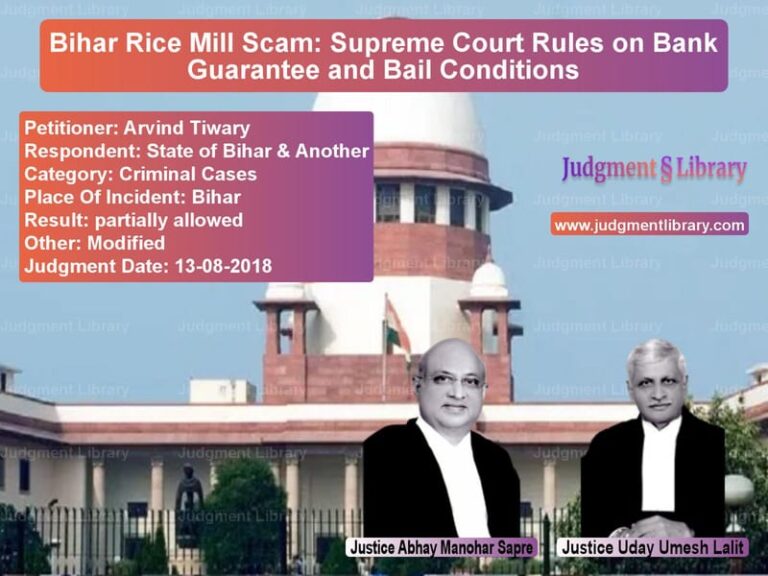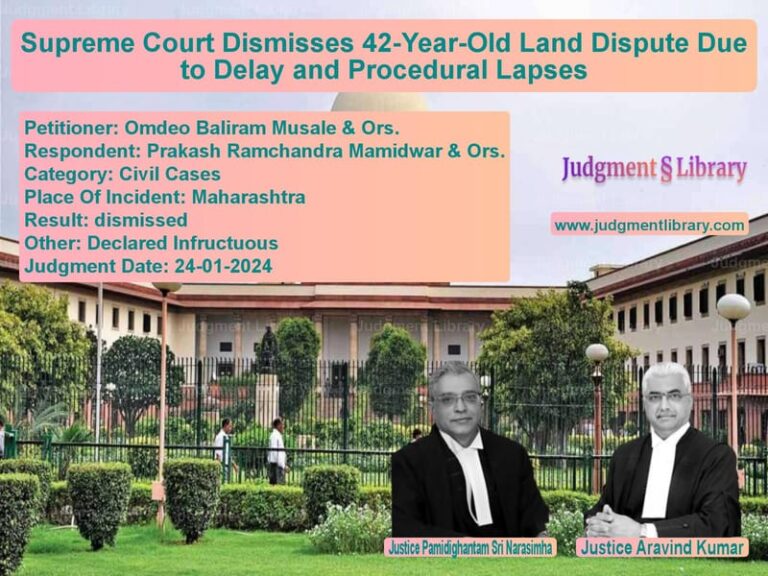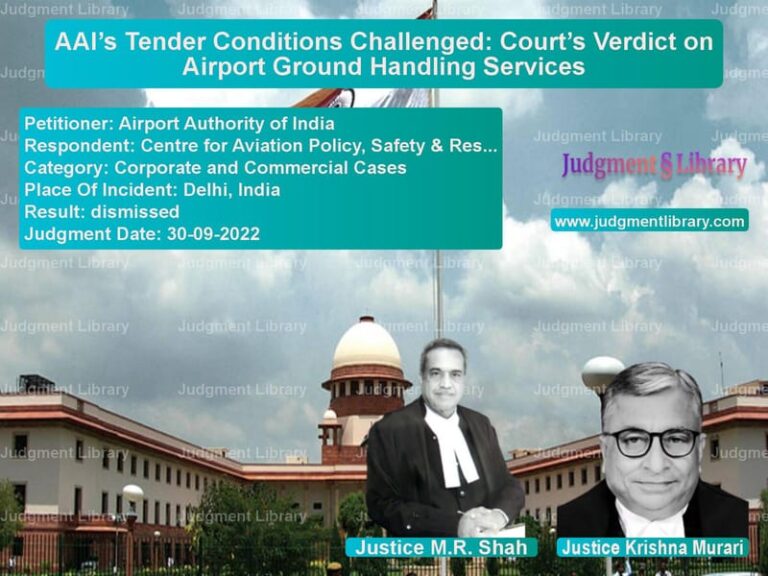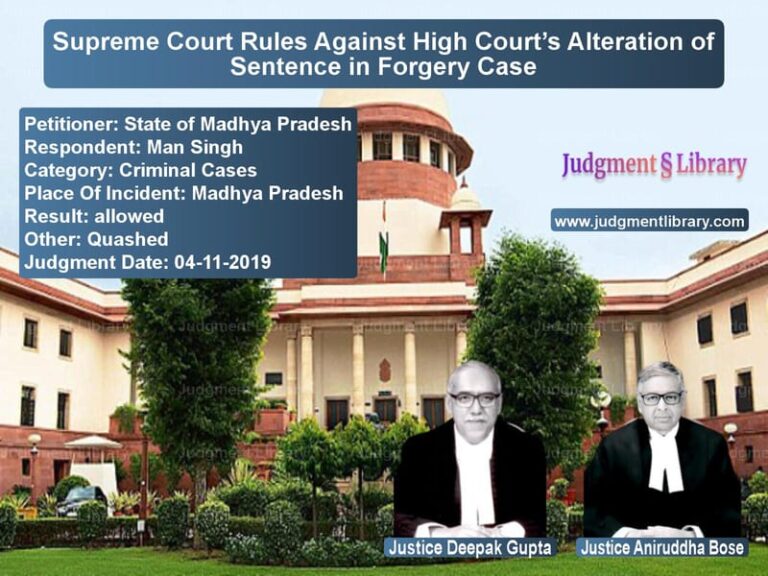Supreme Court Overrules High Court Decision on Insolvency Resolution Process
The case of Mohammed Enterprises (Tanzania) Ltd. vs. Farooq Ali Khan & Others revolves around the validity of the Corporate Insolvency Resolution Process (CIRP) undertaken against Associate Decor Ltd., a corporate debtor. The Supreme Court was called upon to determine whether the High Court of Karnataka was justified in interfering with the resolution process that had already been completed and approved by the Committee of Creditors (CoC).
This ruling is significant as it reinforces the principles governing the Insolvency and Bankruptcy Code (IBC), 2016 and the need for judicial discipline when handling corporate insolvency matters.
Background of the Case
The dispute arose when the corporate debtor, Associate Decor Ltd., defaulted on payments, leading Oriental Bank of Commerce (which later merged with Punjab National Bank) to initiate CIRP proceedings against it. The resolution process resulted in the approval of a resolution plan submitted by Mohammed Enterprises (Tanzania) Ltd. (METL), which was backed by a unanimous vote from the Committee of Creditors (CoC). However, a former director of the corporate debtor, Farooq Ali Khan, challenged the resolution plan, arguing that he was not given adequate notice before the plan’s approval.
Read also: https://judgmentlibrary.com/supreme-court-clarifies-financial-creditor-status-in-insolvency-cases/
Key Developments in the Case
- October 26, 2018: CIRP proceedings were initiated against Associate Decor Ltd. at the request of Oriental Bank of Commerce.
- February 11, 2020: The resolution plan submitted by METL was approved by 100% voting share of the CoC.
- March 9, 2020: METL was declared the successful resolution applicant.
- 2022: The National Company Law Appellate Tribunal (NCLAT) dismissed challenges to the resolution plan.
- 2023: The High Court of Karnataka allowed a writ petition filed by Farooq Ali Khan, setting aside the resolution plan.
- January 3, 2025: The Supreme Court overturned the High Court’s ruling, reinstating the approved resolution plan.
Petitioner’s Arguments
METL, represented by senior counsel, contended that:
- The High Court of Karnataka exceeded its jurisdiction by interfering in an insolvency matter that fell under the exclusive purview of the NCLT and NCLAT.
- The resolution plan had been unanimously approved by the CoC and was legally binding.
- Any challenge to the resolution plan should have been raised through the IBC’s prescribed mechanisms, not through a writ petition.
- The former director, Farooq Ali Khan, was given adequate notice and had failed to raise objections in a timely manner.
- Judicial intervention at this stage undermined investor confidence in India’s insolvency resolution framework.
Respondents’ Arguments
Farooq Ali Khan, the former director of the corporate debtor, argued that:
- He was not given sufficient notice before the CoC meeting that approved the resolution plan.
- The resolution plan was unfair and did not provide for a better settlement option proposed in December 2022.
- Since the CoC had rejected a revised settlement proposal, the High Court had the power to intervene and ensure fairness.
- The principles of natural justice were violated in the resolution process.
Supreme Court’s Analysis
Key Observations
- “The Insolvency and Bankruptcy Code (IBC) is a complete code in itself, providing sufficient checks, balances, and remedial avenues.”
- “Once the Committee of Creditors has approved a resolution plan, courts must be cautious before interfering.”
- “Judicial intervention should not disrupt the sanctity of the insolvency process unless there is a glaring procedural lapse.”
- “The resolution applicant had followed all legal requirements, and delaying the implementation of the plan would set a bad precedent.”
Rejection of Natural Justice Argument
The Court rejected the claim that the principles of natural justice were violated, noting that the respondent had been given an opportunity to raise objections during the resolution process.
IBC’s Exclusive Jurisdiction
The Supreme Court reaffirmed that the NCLT and NCLAT are the appropriate forums for handling insolvency disputes and that High Courts should not interfere in such cases.
Final Judgment
The Supreme Court ruled in favor of METL and held that:
- The High Court’s order was set aside as it lacked jurisdiction under the IBC.
- The resolution plan approved by the CoC on February 11, 2020, was reinstated.
- The Adjudicating Authority (NCLT) was directed to expedite the resolution process without further delay.
Implications of the Judgment
This ruling has significant implications for India’s insolvency framework:
- Reinforces the finality of CoC-approved resolution plans under the IBC.
- Limits judicial interference by High Courts in insolvency matters.
- Strengthens investor confidence in India’s bankruptcy resolution process.
- Upholds the NCLT and NCLAT’s jurisdiction as the exclusive forums for insolvency disputes.
Conclusion
The Supreme Court’s decision in this case reinforces the principle that insolvency resolution should follow the structured framework of the IBC. By overruling the High Court’s interference, the ruling upholds the integrity of the resolution process and ensures that stakeholders in corporate insolvency matters receive fair and legally sound outcomes.
Petitioner Name: Mohammed Enterprises (Tanzania) Ltd..Respondent Name: Farooq Ali Khan & Others.Judgment By: Justice Pamidighantam Sri Narasimha, Justice Manoj Misra.Place Of Incident: Bangalore, Karnataka.Judgment Date: 03-01-2025.
Don’t miss out on the full details! Download the complete judgment in PDF format below and gain valuable insights instantly!
Download Judgment: mohammed-enterprises-vs-farooq-ali-khan-&-ot-supreme-court-of-india-judgment-dated-03-01-2025.pdf
Directly Download Judgment: Directly download this Judgment
See all petitions in Bankruptcy and Insolvency
See all petitions in Corporate Compliance
See all petitions in Company Law
See all petitions in Judgment by P.S. Narasimha
See all petitions in Judgment by Manoj Misra
See all petitions in allowed
See all petitions in Quashed
See all petitions in supreme court of India judgments January 2025
See all petitions in 2025 judgments
See all posts in Corporate and Commercial Cases Category
See all allowed petitions in Corporate and Commercial Cases Category
See all Dismissed petitions in Corporate and Commercial Cases Category
See all partially allowed petitions in Corporate and Commercial Cases Category







